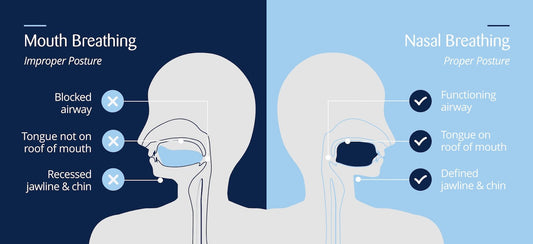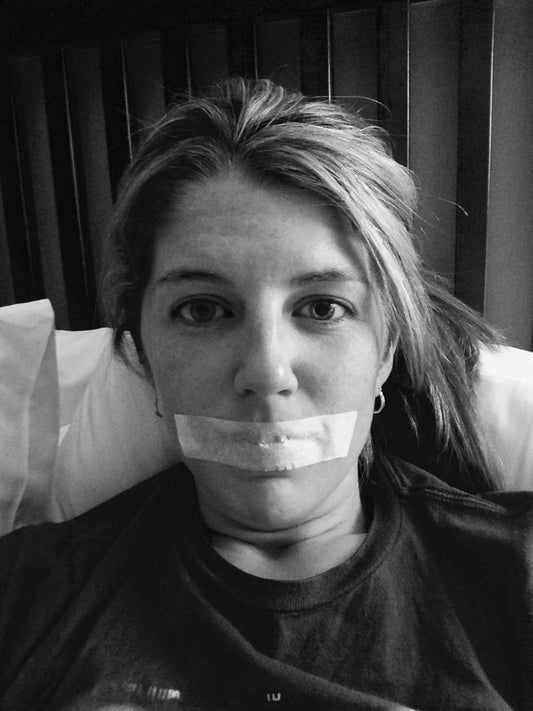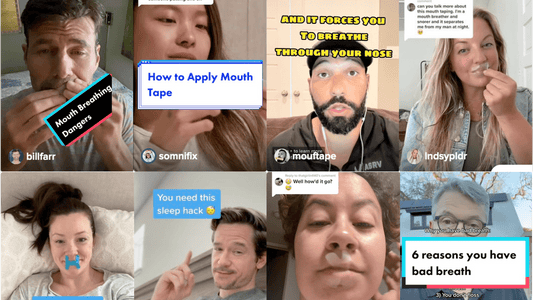Struggling with disruptive snoring or symptoms of sleep apnea?
You may be wondering whether to try a CPAP machine or simple mouth taping at night.
Both can potentially improve breathing and sleep quality. So how do you choose which route is right for you?
Here’s an in-depth comparison of CPAP and mouth taping to help you decide.
What is CPAP?
First, a quick refresher on what CPAP is.
CPAP stands for continuous positive airway pressure. It’s the most common treatment prescribed for moderate to severe sleep apnea, a disorder where the airway becomes obstructed during sleep causing pauses in breathing and loud snoring.
A CPAP machine uses mild air pressure to keep the breathing airways open. You wear a sealed mask connected to a bedside CPAP device that pumps a constant, light stream of air through the mask into your nose and throat while you sleep. This prevents tissues from collapsing to block airflow.
What is Mouth Taping?
Mouth taping simply refers to placing a small piece of porous medical like SomaBody Mouthtape over the lips before sleep. This keeps the mouth closed and encourages breathing through the nose instead. It’s a simple technique thought to potentially help with mild sleep apnea by promoting nasal breathing.
How Do They Compare for Sleep Apnea?
For severe cases, CPAP is the gold standard treatment proven to alleviate most apnea symptoms. Mouth taping alone is not recommended for severe sleep apnea, though it is a great complimentary aid that will help you improve the root cause of your issue over time.
For mild sleep apnea, studies show mouth taping can significantly decrease snoring and reduce apneic events for some people, especially mouth breathers. However, more research is still ongoing for long-term efficacy.
Categories of Pros and Cons
Ease of Use
CPAP requires wearing a somewhat cumbersome face mask tethered to a machine. Most adjust to this over time but some struggle. Mouth taping is extremely simple, fast, and convenient to apply before bed and to wear throughout the night.
Cost
Buying a new CPAP device and supplies can cost over $1000, often with recurring costs. Mouth tape like the ones available through SomaBody are very affordable.
Portability
Transporting a CPAP machine makes travel challenging. Mouth tape is easily packable for trips away from home.
Side Effects
Some experience skin irritation or air swallowing from CPAP masks. Mouth taping rarely causes side effects though chapped lips are possible.
Effectiveness
For moderate/severe apnea, CPAP is more reliably effective. Mouth taping alone may not fully treat these cases. But for mild issues, mouth taping is very effective.
Consistency
Both requires diligent, nightly use for it to be most effective.
Pros and Cons Summary
CPAP Pros
- Proven relief for severe apnea
- Adjustable customized airflow
CPAP Cons
- Expensive
- Cumbersome device
- Can cause facial irritation
- Does not treat underlying cause - reliant for life
Mouth Taping Pros
- Inexpensive
- Simple and portable
- Little to no side effects
- Treats underlying cause
Mouth Taping Cons
- Less reliable for severe cases
- Requires persistent use
So Which Route is Best?
For mild sleep apnea, mouth taping alone may provide noticeable relief of symptoms and a long term solution through physiological transformation. It is well worth trying first given the ease of implementation and its affordability.
But for more severe cases causing major impairment, CPAP remains the gold standard treatment to immediately alleviate obstructed breathing. However, mouth taping can also be used in conjunction with CPAP for severe sleep apnea to amplify the benefits.
Over time, consistent mouth taping trains the body to breathe through the nose. This can reduce reliance on CPAP down the road or at least lower the required pressure settings for comfort. Mouth taping works to permanently change breathing physiology for the better.
The takeaway is mouth taping offers a simple, non-invasive technique to try either on its own for mild apnea or paired with CPAP for more severe cases. Work closely with your sleep doctor to determine the best personal path forward based on your needs and preferences. But know both options can play a role in getting restful sleep.




